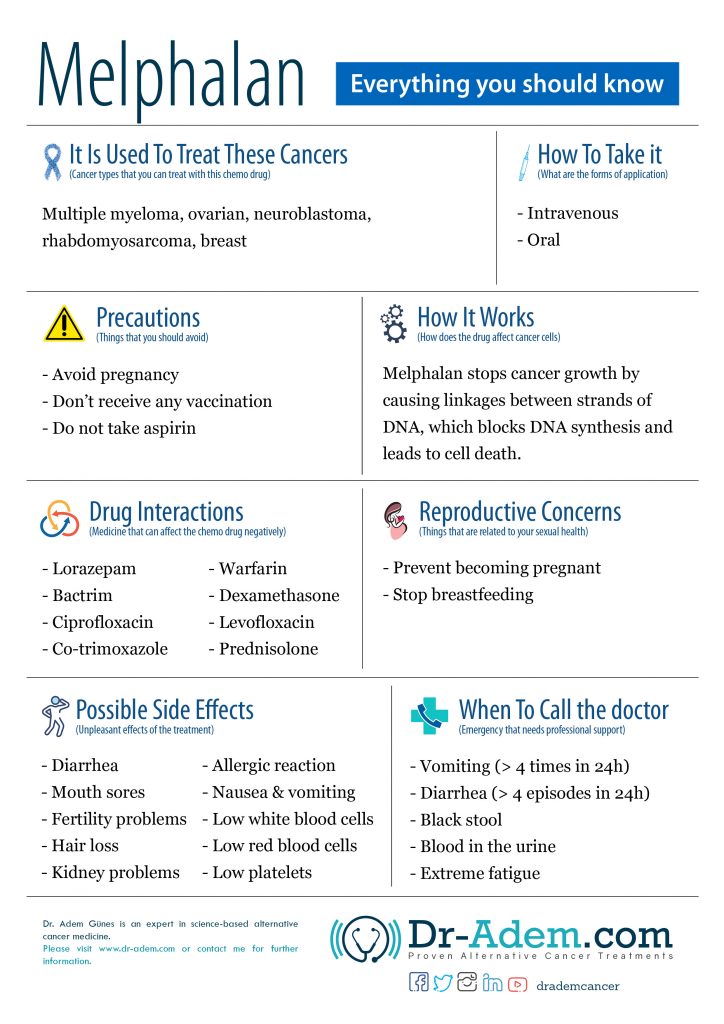Fact Sheet – Everything You Should Know
In this Melphalan fact sheet, you’ll get to know about the precautions, usage, possible side effects, and the types of cancer that you can treat with this chemo drug.

Embed this Infographic on your site:
<a href='https://dr-adem.com/melphalan-fact-sheet/'><img src='https://dr-adem.com/wp-content/uploads/2019/11/Melphalan2-990x1400.jpg' alt='Melphalan Fact Sheet'/></a>Here’s the Melphalan fact sheet to get detailed information about Melphalan
It Is Used To Treat These Cancers
(Cancer types that you can treat with this chemo drug)
- Multiple myeloma
- Ovarian
- Neuroblastoma
- Rhabdomyosarcoma
- Breast
How To Take it
(What are the forms of application)
- Intravenous
- Oral
Precautions
(Things that you should avoid)
- Avoid pregnancy
- Don’t receive any vaccination
- Do not take aspirin
Mechanism of Action of Melphalan
(How does the drug affect cancer cells)
Melphalan belongs to the alkylating agents (mustard derivate subgroup). It works through 3 different mechanisms: It attaches itself to DNA bases (building blocks of the DNA strands), which leads to the DNA being fragmented when the repair enzymes try to replace these bases with normal ones. This mechanism prevents DNA synthesis and RNA transcription. Melphalan can also damage the DNA by forming cross-links between DNA atoms, which prevents it from being separated and, therefore, prevents synthesis or transcription. The third mechanism is inducting of mispairing of the nucleotides, leading to mutations. These 3 mechanisms lead eventually to apoptosis (programmed cellular death). Melphalan is also cell phase non-specific.
Drug Interactions
(Medicine that can affect the chemo drug negatively)
- Lorazepam
- Bactrim
- Ciprofloxacin
- Co-trimoxazole
- Warfarin
- Dexamethasone
- Levofloxacin
- Prednisolone
Reproductive Concerns
(Things that are related to your sexual health)
- Pregnancy prevention during and until 6 months after the treatment (men and women)
- Stop breastfeeding
- Consider sperm freezing if willing to bear children
Possible Side Effects
(Unpleasant effects of the treatment)
- Diarrhea
- Mouth ulcers
- Hair loss
- Kidney and liver toxicity
- Allergic reactions
- Nausea & vomiting
- Low white blood cells: raise the risk of bacterial infection
- Low red blood cells: can lead to fatigue, general lack of interest and drive to be active
- Low platelets: can lead to bleeding (nose, gums) and in extreme cases to internal bleeding (intestinal, brain, joints)
- Infertility
When To Call the doctor
(Emergency that needs professional support)
- Vomiting (>4 times in 24h): can lead to severe dehydration and electrolyte disbalance
- Diarrhea (>4 episodes in 24h): can also lead to severe dehydration and electrolyte disbalance
- Black stool: can be a sign of intestinal bleeding
- Blood in the urine
- Extreme fatigue: can be a sign of severe anemia (low blood cells)
- Fever > 37,8°C


